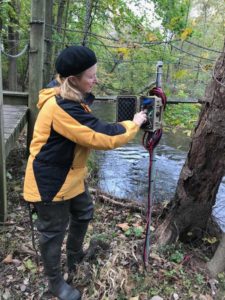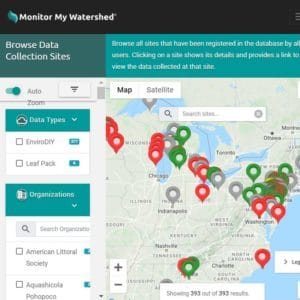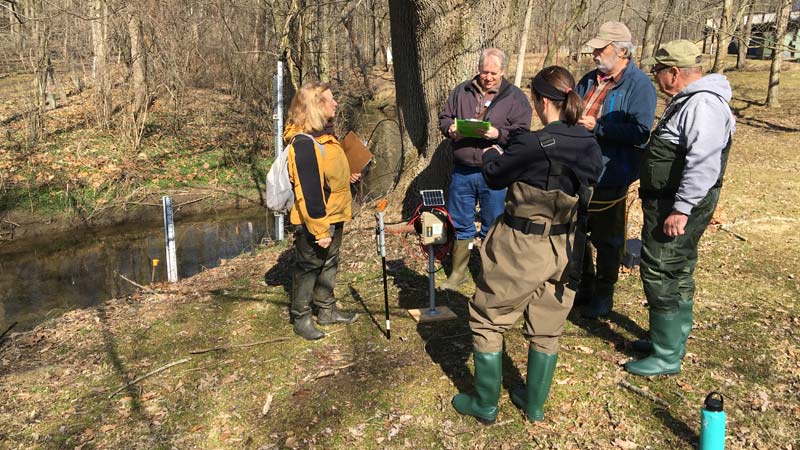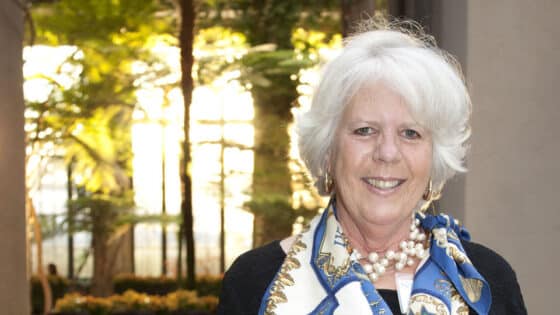This article originally appeared on the PennState Extension website and is reprinted with permission.
By Carol Armstrong
Master Watershed Stewards in Berks, Bucks, Chester and Delaware Counties are utilizing citizen science to work with in-stream sensors monitoring water quality in their local watersheds.
What does it take to understand, protect, and restore a local watershed? One solution is strong collaborative partners who offer different resources. Stroud Water Research Center is building capacity among watershed groups across the Delaware River Basin (DRB) to better address questions about how local watersheds function and how to restore and protect these resources with support from the Penn State Extension Master Watershed Steward Program (MWS).
The overarching goal of this project is to facilitate development of science capacity to support stream and river protection and restoration by citizen science programs (watershed associations, schools, and other ecology centers) in the Delaware River Basin.

Carol Armstrong working with a stream sensor station.
One main component of this work in the DRB has involved monitoring conditions in streams and rivers using automated real-time sensor stations. This work has involved outreach to over 35 citizen science nonprofit organizations and hundreds of people including volunteers, managers, teachers, students, and scientists.
To date, over 70 EnviroDIY™ sensor stations have been deployed with groups throughout the DRB. These stations are equipped with a powerful, user-programmable Mayfly Data Logger, chemistry sensors, and hardware and software supported by the Stroud Center.
Each EnviroDIY in-stream sensor station is owned by a non-governmental organization for a variety of purposes including assessing stream impacts from water treatment plants, runoff from malls, parking lots, high intensity development, as well as assessing new green best management practices, and for educating students from elementary school to training professionals.
Some of the most effective stations are those that can compare pre- and post-effects, such as water quality upstream and downstream of a development that increases the impervious areas of a watershed and introduces additional pollutants. Other stations that represent spatial gradients in land use and human impact are also effective at characterizing relationships between instream conditions and the activities on land. The Stroud Center is also aggregating and comparing sites across the basin and analyzing broad-scale patterns.
 These sensor stations measure the stream conditions every five minutes and transmit signals from the stations via cellular networks to the Monitor My Watershed® data portal, where data can be viewed in real time, both on a computer and on a mobile phone. Keeping these stations functioning and producing useable data requires consistent maintenance to prevent sensor and station damage, and to identify conditions that compromise its functioning or the data. Keeping the loggers and solar panels clear of debris, checking for moisture in the logger box and battery, and doing regular quality control measurements are important tasks for both citizen science and professional sensor stations.
These sensor stations measure the stream conditions every five minutes and transmit signals from the stations via cellular networks to the Monitor My Watershed® data portal, where data can be viewed in real time, both on a computer and on a mobile phone. Keeping these stations functioning and producing useable data requires consistent maintenance to prevent sensor and station damage, and to identify conditions that compromise its functioning or the data. Keeping the loggers and solar panels clear of debris, checking for moisture in the logger box and battery, and doing regular quality control measurements are important tasks for both citizen science and professional sensor stations.
These lofty goals to protect and restore stream ecologies and human water quality need volunteer support. While the organizations utilize their own teams of volunteers to maintain and manage some stations and sites, more help was needed. Erin Frederick, Coordinator of the state-wide Master Watershed Steward program, and David Bressler of the Stroud Center, joined their resources.
The Stroud Center provides multiple training sessions, measurement equipment, experience doing the measurements in the field, and a private group on the WikiWatershed® website where those involved can communicate about the stations, successes, problems, and receive guidance on solutions. The Master Watershed Steward volunteer provides weekly monitoring of the Delaware River basin stations to troubleshoot data irregularities, and works with the Stroud Center to develop a mentoring program to train and guide new MWS volunteers. The Master Watershed Stewards of Berks, Bucks, Chester, and Delaware Counties now number 30 who are active in assisting stations and working with the data to better understand the watersheds.

Carol Armstong (left) instructs MWS volunteers at a stream monitoring station. Photo: George Seeds, Master Watershed Steward
Master Watershed Stewards are active in supporting the environmental and ecological scientists and citizen scientists managing the sensor stations to ask and answer context-based questions about their locales.
The Stroud Center’s restoration team is helping citizen scientists to translate their knowledge and experience into regional policies and practices with the focus always on protecting and improving the health of streams and cleaner water for future generations. All of the stakeholders described here are helping to build a comprehensive and publicly accessible dataset for the Delaware River Basin.
EnviroDIY and Monitor My Watershed are part of the WikiWatershed® Toolkit, a Stroud Center initiative to help citizens, conservation practitioners, municipal decision-makers, researchers, educators, and students advance knowledge and stewardship of fresh water.



